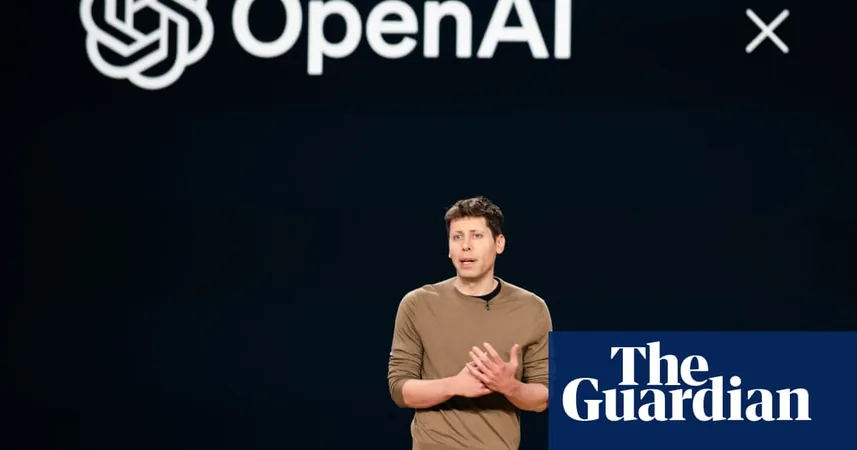
OpenAI Launches AI Video Generator Sora to the Public – Unleashing a New Era of Creativity!
2024-12-09
Author: Jia
OpenAI Launches AI Video Generator Sora to the Public – Unleashing a New Era of Creativity!
After much anticipation, anyone in the United States can now access OpenAI’s revolutionary AI video generator, Sora. The company made this exciting announcement on Monday, officially transitioning Sora from a limited-access tool to a public resource for creators. Initially unveiled in February, Sora was exclusive to select artists, filmmakers, and safety testers. However, the launch was met with overwhelming demand, causing intermittent difficulties with new sign-ups on OpenAI’s website due to heavy traffic.
Sora is a state-of-the-art text-to-video generator. Users can create video clips simply by providing written prompts. An intriguing example showcased on OpenAI’s site invites users to describe a scene as 'a wide, serene shot of a family of woolly mammoths in an open desert.' The resulting video artfully depicts three mammoths traversing the sandy landscape, showcasing the tool's potential to bring imaginative visions to life.
In a blog post, OpenAI expressed hope that Sora's release would empower users to explore innovative forms of creativity, tell compelling stories, and fundamentally expand the horizons of video storytelling. Known primarily for its popular chatbot, ChatGPT, OpenAI is diversifying its suite of generative AI technologies and has future plans for a voice-cloning tool, alongside an integrated image generation capability via Dall-E.
Before opening Sora to the public, tech reviewer Marques Brownlee had the opportunity to test the platform. He described his experience as both 'horrifying and inspiring.' According to Brownlee, Sora excelled in generating landscapes and stylistic visuals but struggled with accurately rendering physical realism. Some filmmakers who previewed the tool reported encountering unusual visual anomalies in the videos created.
In the past weeks, OpenAI had temporarily suspended user access after discovering that a group of artists had developed a way to bypass the system. These artists, referring to themselves as the 'Sora PR Puppets,' accused the company of exploiting creative talent while threatening to undermine artists' livelihoods. Their concerns reflect a broader apprehension in the artistic community regarding potential job displacement due to technology.
While generative AI technology has made significant strides over the past year, challenges such as hallucinations—misleading or incorrect outputs—and issues with plagiarism persist. Critics are particularly concerned about the potential for malicious uses of AI video technology, including the spread of disinformation, scams, and creating deepfakes. There have been recent high-profile cases of deepfakes involving public figures like Ukrainian President Volodymyr Zelenskyy and U.S. Vice President Kamala Harris, sparking debates on the ethical implications of such technology.
To address these concerns, OpenAI has announced that Sora will initially restrict uploads involving specific individuals and will prohibit content featuring nudity. The company is committed to blocking harmful applications, including child sexual abuse materials and ethically troubling deepfakes.
Sora will be available for users who subscribe to OpenAI's suite of tools. Access is granted to those in the U.S. and 'most countries internationally,' though unfortunately, users in the UK and Europe will be left out due to copyright issues.
The advent of Sora marks a pivotal moment in the intersection of technology and creativity—could this innovative tool redefine how we perceive and create video content? Stay tuned as we continue to explore the implications and possibilities of AI in the world of digital storytelling!

 Brasil (PT)
Brasil (PT)
 Canada (EN)
Canada (EN)
 Chile (ES)
Chile (ES)
 Česko (CS)
Česko (CS)
 대한민국 (KO)
대한민국 (KO)
 España (ES)
España (ES)
 France (FR)
France (FR)
 Hong Kong (EN)
Hong Kong (EN)
 Italia (IT)
Italia (IT)
 日本 (JA)
日本 (JA)
 Magyarország (HU)
Magyarország (HU)
 Norge (NO)
Norge (NO)
 Polska (PL)
Polska (PL)
 Schweiz (DE)
Schweiz (DE)
 Singapore (EN)
Singapore (EN)
 Sverige (SV)
Sverige (SV)
 Suomi (FI)
Suomi (FI)
 Türkiye (TR)
Türkiye (TR)
 الإمارات العربية المتحدة (AR)
الإمارات العربية المتحدة (AR)